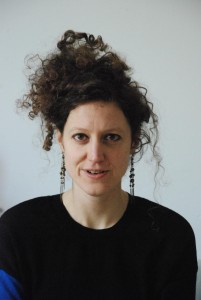Photo: Magda Barthofer
Charlotte Simmonds, author of “Kipaw-paw-pish,” spoke with us about finding truth in her writing process–and advice for others who seek to tell the truth.
How did you choose the distinctive voice in which you wrote “Kipaw-paw-pish!”? And how close to the “real” you is that voice?
While “Kipaw-paw-pish!” is factual, I chose a naïve narrator to introduce the reader to King Homeboy. Part of that is a reflection of the way I felt about myself at the time (this was actually written in 2009). I had just emerged from many very dark and difficult years, and my escape from this era of my life took the form of quitting alcohol, cigarettes, psychiatric medication, sex, and romantic relationships and basically just going straight-edge for the next seven years. In many ways, at 26, I was going through a second adolescence but doing it the way I wished I’d done it the first time: spending a lot of time skateboarding, Dumpster diving, making catnip tea, and staying up late while sober.
The naïve storyteller reflects not the way I spoke but the way I felt in relation to my environment at the time, as well as physically in relation to King Homeboy. He is quite large in stature. I think it would be hard not to feel small next to him. He could be intimidating if he chose, but instead he is open, disarming and sometimes childlike himself.
The other reason the naïve narrator was important was that I wanted a willful suspension of cynicism from the reader. I know the reader knows what beat-boxing, lottery tickets, hallucinations, and The Guinness Book of World Records are. I don’t need to explain them. I know, Masha knows, and Toki knows that he wasn’t actually about to die. But I want you [the reader] not to be the serious adult you are, even if only for the few seconds it takes to read those lines. I want you to believe this the way he wanted us to believe it. And the narrator that I am in real life can’t do this. I’m sceptical, cynical and suspicious. It’s also hard for serious adults to be awed by a busker with no instruments spitting into his hands on the street. You need to be fairly credulous to be amazed by beat-boxing, and I want you to be amazed. I want you to be credulous.
How do you determine something is worth writing about?
It’s not something I consciously analyze. I suppose the things that aren’t worth writing about, for me, are only the things I haven’t thought about. Once I’m aware of something and it enters my field of thought, it’s usable material. Then there’s the question of whether what I write about is worth reading about. I’m sure every writer produces far more work than they will ever have published… Determining whether it’s worth reading about is usually left to other people.
What do you find most challenging about writing the truth?
I worry about hurting people’s feelings. Even in my plays, fiction, and poetry, my writing is very much a collage with bits and pieces thieved from actual conversations, events, situations I’ve been in. I’m not good at imagining or inventing things, only at reassembling them. So I worry a lot about people I know recognizing themselves or things they’ve said and misinterpreting it. This wasn’t something I used to think about at all when I was younger, but I think I’m a lot more conscious of it now. I used to call it the hazards of sleeping with an autobiographical writer, but it’s really a hazard of being anywhere near an autobiographical writer, but that’s a pretty victim-blaming mentality to have. I should really just be more sensitive.
What is the best piece of advice you’ve ever received?
Due to timetabling coincidences, I was fortunate enough to end up with the New Zealand poet Rachel Bush as my English teacher for all three years I attended secondary school. She was extremely influential as a mentor and I do not believe I would have “become a writer” without her encouragement, support, and advice on practical things like submitting to journals. However, she is also the only English teacher to have ever given me a low mark, at any time in my life – a 3 out of 5 for a creative writing assignment. My story, which seemed to me the most brilliant thing I’d ever written and bore the profound (I was 16!) title “[Untitled],” was returned to me with Fleur Adcock’s poem “The Prize-Winning Poem” attached to it. This poem is not itself a prize-winning poem and is a little dated, but it remains, for the most part, excellent writing advice, which I still refer others to. My story contained a lot of “large meaningless concepts” and words like “macrocosm,” which Adcock says to avoid. I think I may have kept writing simply because I felt so insulted.
See Adcock’s “The Prize-Winning Poem” online here.









